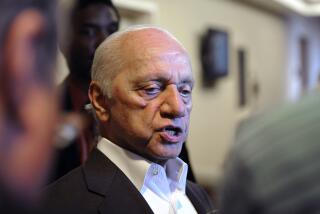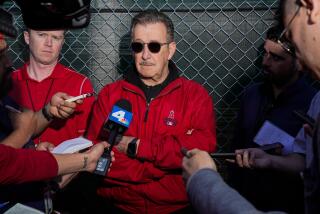Angelos ‘Dominant’ Force Behind Cuba-Orioles Series
- Share via
BALTIMORE — Peter Angelos already knew plenty about Cuba when he sat down to dinner with two men who wanted the Baltimore Orioles to play the Cuban national team.
Angelos, eager to ease the tension between the communist country and the United States, immediately embraced the ambitious plan.
“Peter expressed sympathy for Fidel Castro. He said, ‘For crying out loud, Kennedy tried to invade the island and tried to kill him,”’ Saul Landau said.
Landau, who has produced four documentaries on Castro, and Scott Armstrong, an author and journalist who had visited Cuba over the years, made the unusual presentation to the Orioles’ owner in 1996.
Three years later, the Orioles became the first major league team to play in Havana since 1959. On March 28, Baltimore beat a collection of Cuban all-stars 3-2 in an 11-inning exhibition game. The return match is Monday night at Camden Yards.
Armstrong first pitched the idea of a baseball game between Cuban stars and the Orioles to former team owner Edward Bennett Williams in the early 1980s. He also discussed the concept with then-baseball commissioner Bart Giamatti and union head Donald Fehr.
But it was Angelos who followed through.
“Peter Angelos was the only guy to stand at the plate to take a swing at this,” Armstrong said. “Edward Bennett Williams laughed at me because he had a position on Ronald Reagan’s advisory board, and that administration would have nothing to do with Cuba.
“Giamatti had a vision--he was definitely interested--but he died before we could act on it.”
Fehr visited Cuba during the 1994 players’ strike and hoped to stage a game between the Cubans and a collection of major league stars. But the plan ended after baseball was denied an antitrust exemption.
Angelos, however, was relentless.
“The notion that he would go through the expense, the red tape and the inconvenience was never a question,” Armstrong said. “He just thought it was a good idea.”
Rebuffed in his first bid in 1996, Angelos didn’t quit. Staying in touch with the State Department and the White House, he got a break in January when President Clinton loosened restrictions against Cuba. Even then, it took several weeks of negotiations and an all-night session in March to make it happen.
“Peter was the dominant party in the room,” Armstrong said.
Critics of the series suggest that Angelos was looking for publicity or angling to give the Orioles an advantage tapping into Cuban talent.
Angelos refused several interview requests by The Associated Press. Both his sons, however, insisted that the owner’s motivation was not self-serving.
“He’s always had an interest in politics, especially foreign policy. That, and his involvement with baseball, made it a natural thing,” said Orioles executive vice president John Angelos. “It’s always been a nonpolitical issue with him.”
The connection was baseball, America’s national pastime and a way of life for the Cubans.
“He felt that something could be achieved by the people getting together and playing a baseball game,” said Louis Angelos, who works in his father’s law offices. “He said, ‘Why not just go and play? Nothing bad can come from it.”’
Cuban dissidents don’t see it that way.
Groups of anti-Castro protesters from Miami and the New York-New Jersey metropolitan area plan to travel to Baltimore by bus to protest outside the stadium Monday.
Jose Basulto, president of Brothers to the Rescue, a Miami-based Cuban democracy group, said the games will only serve to provide revenue and positive public relations for the Castro government that has caused Cuba’s people to suffer.
“They are prolonging that suffering by engaging in this,” Basulto said.
Sandy Alderson, executive vice president of baseball operations in the commissioner’s office, worked side by side with Peter Angelos in the negotiations and saw no indication of a hidden agenda.
“His interests were selfless. He was not looking for a competitive advantage for the Orioles,” Alderson said. “I think he was driven by a strong feeling that baseball was the key to the cultures of two countries that have been separated a long time.”
As a result of Angelos’ effort, other major leagues teams might one day travel to Havana to play. The Anaheim Angels have already filled out the necessary papers.
But the Baltimore Orioles will always be known as the ones who started it.
More to Read
Go beyond the scoreboard
Get the latest on L.A.'s teams in the daily Sports Report newsletter.
You may occasionally receive promotional content from the Los Angeles Times.










